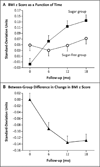Resolved: there is sufficient scientific evidence that decreasing sugar-sweetened beverage consumption will reduce the prevalence of obesity and obesity-related diseases
- PMID: 23763695
- PMCID: PMC5325726
- DOI: 10.1111/obr.12040
Resolved: there is sufficient scientific evidence that decreasing sugar-sweetened beverage consumption will reduce the prevalence of obesity and obesity-related diseases
Abstract
Sugar-sweetened beverages (SSBs) are the single largest source of added sugar and the top source of energy intake in the U.S. diet. In this review, we evaluate whether there is sufficient scientific evidence that decreasing SSB consumption will reduce the prevalence of obesity and its related diseases. Because prospective cohort studies address dietary determinants of long-term weight gain and chronic diseases, whereas randomized clinical trials (RCTs) typically evaluate short-term effects of specific interventions on weight change, both types of evidence are critical in evaluating causality. Findings from well-powered prospective cohorts have consistently shown a significant association, established temporality and demonstrated a direct dose-response relationship between SSB consumption and long-term weight gain and risk of type 2 diabetes (T2D). A recently published meta-analysis of RCTs commissioned by the World Health Organization found that decreased intake of added sugars significantly reduced body weight (0.80 kg, 95% confidence interval [CI] 0.39-1.21; P < 0.001), whereas increased sugar intake led to a comparable weight increase (0.75 kg, 0.30-1.19; P = 0.001). A parallel meta-analysis of cohort studies also found that higher intake of SSBs among children was associated with 55% (95% CI 32-82%) higher risk of being overweight or obese compared with those with lower intake. Another meta-analysis of eight prospective cohort studies found that one to two servings per day of SSB intake was associated with a 26% (95% CI 12-41%) greater risk of developing T2D compared with occasional intake (less than one serving per month). Recently, two large RCTs with a high degree of compliance provided convincing data that reducing consumption of SSBs significantly decreases weight gain and adiposity in children and adolescents. Taken together, the evidence that decreasing SSBs will decrease the risk of obesity and related diseases such as T2D is compelling. Several additional issues warrant further discussion. First, prevention of long-term weight gain through dietary changes such as limiting consumption of SSBs is more important than short-term weight loss in reducing the prevalence of obesity in the population. This is due to the fact that once an individual becomes obese, it is difficult to lose weight and keep it off. Second, we should consider the totality of evidence rather than selective pieces of evidence (e.g. from short-term RCTs only). Finally, while recognizing that the evidence of harm on health against SSBs is strong, we should avoid the trap of waiting for absolute proof before allowing public health action to be taken.
Keywords: Diabetes; nutrition; obesity; sugar-sweetened beverages.
© 2013 The Author. obesity reviews © 2013 International Association for the Study of Obesity.
Conflict of interest statement
Potential conflicts of interest: None
Figures




Comment in
-
Will reducing sugar-sweetened beverage consumption reduce obesity? Evidence supporting conjecture is strong, but evidence when testing effect is weak.Obes Rev. 2013 Aug;14(8):620-33. doi: 10.1111/obr.12048. Epub 2013 Jun 7. Obes Rev. 2013. PMID: 23742715 Free PMC article.
References
-
- Malik VS, Willett WC, Hu FB. Global obesity: trends, risk factors and policy implications. Nature reviews Endocrinology. 2012 - PubMed
-
- Flegal KM, Carroll MD, Kit BK, Ogden CL. Prevalence of obesity and trends in the distribution of body mass index among US adults, 1999–2010. JAMA : the journal of the American Medical Association. 2012;307:491–497. - PubMed
-
- Finkelstein EA, Trogdon JG, Cohen JW, Dietz W. Annual medical spending attributable to obesity: payer-and service-specific estimates. Health Aff (Millwood) 2009;28:w822–w831. - PubMed
-
- CDC. National diabetes fact sheet: national estimates and general information on diabetes and prediabetes in the United States. [WWW document] URL http://www.cdc.gov/diabetes/pubs/estimates11.htm.
Publication types
MeSH terms
Substances
Grants and funding
LinkOut - more resources
Full Text Sources
Other Literature Sources
Medical

